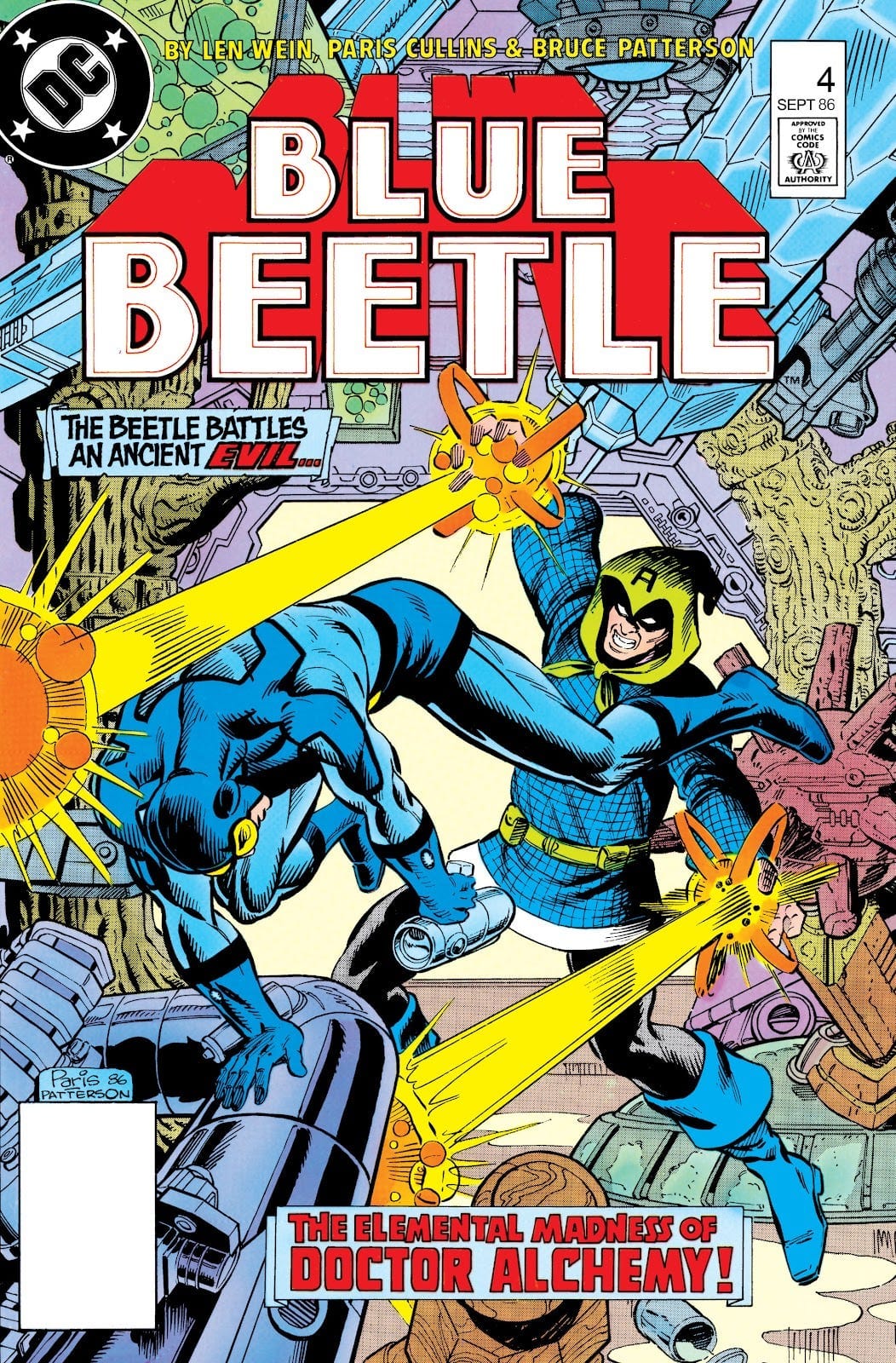What do Eyebrows McGee and a marriage proposal have in common?
—unfortunately, not enough for entertainment purposes. But they are in the same issue!
Bulletpoints
This issue is good if you like:
- A random Flash villain showing up only to essentially defeat himself in the end
- Bad fashion sense pretty much everywhere
- I mean, there’s The Eighties and then there’s this, y’know?
- Things starting to go just that bit wrong for our beloved Beetle
- A Vic Sage cameo, for fans of— one iteration of The Question, anyway!
- A relatively diet issue that moves things but fails to fill the metaphorical belly
- Not that that’s a bad thing, can’t hit ‘em all out of the park
- Some interesting interpersonal dynamics, which leads to at least—
- —one marriage proposals doomed in retrospect
- Villainous comeuppance by the end
This issue sucks if you’re looking for:
- The more charming pacing of the first three issues; this one feels weirdly draggy
- That’s about it, though; it might be lite on substance, but this is still a wholly competent book
What’s Good for the Gold(en Goose)—
I have a tendency, when reviewing Booster’s book, to go off on tangents. Part of that is because the guy’s a human dumpster fire and therefore fascinating because of it; he has such interesting (and shockingly cohesive and linear!) characterization that it’s really easy to view him with that Watsonian lens. Even when something inexplicable happens — like his sudden!sexism when Dan Jurgens took over the JLA post-Giffen/DeMatteis — you can usually make a solid in-universe psychological argument for why Booster’s acting that way based on context clues and events and prior established characterization.
Ted, by contrast, is a wholly different critter. Mostly because, as of this point in this series, he is emphatically not a human dumpster fire.
That doesn’t make Ted somehow less interesting, mind. It just means that there’s less to dig around in, as yet, in this book; Ted Kord is a relatively straight-forward fella at this point in time. He’s got lots of laudable traits, some realistic flaws and is definitely the kind of person most people would be comfortable calling their friend. This is also in line with his Charlton characterization: Competent, good-natured, pretty funny.
That being said, Ted’s characterization isn’t nearly as cohesive or linear as Booster’s is and that’s because of the JLI.
Before anyone thinks I’m here to just bash the Giffen/DeMatteis Justice League: Buddy, that’s where I cut my teeth on these characters and fell in love with them. Yes, even including Guy. There are things I think that writing team did well and then there are things I think they did poorly; like I’ve mentioned more than once, I don’t lionize people and I don’t put professional writers on pedestals because I am also a professional writer and therefore I know how full of bullshit we all actually are. 🤣 So if you can feel your hackles standing up because I’m slaughtering one of your sacred cows, then god help you when I start really barbecuing out here.
All that being said: They kinda did a really bad job with Ted sometimes, and Ted never actually recovered from the damage that they did to his character, even when they themselves tried to walk it back.
Case in point: Even recently, in All Along the Watchtower—
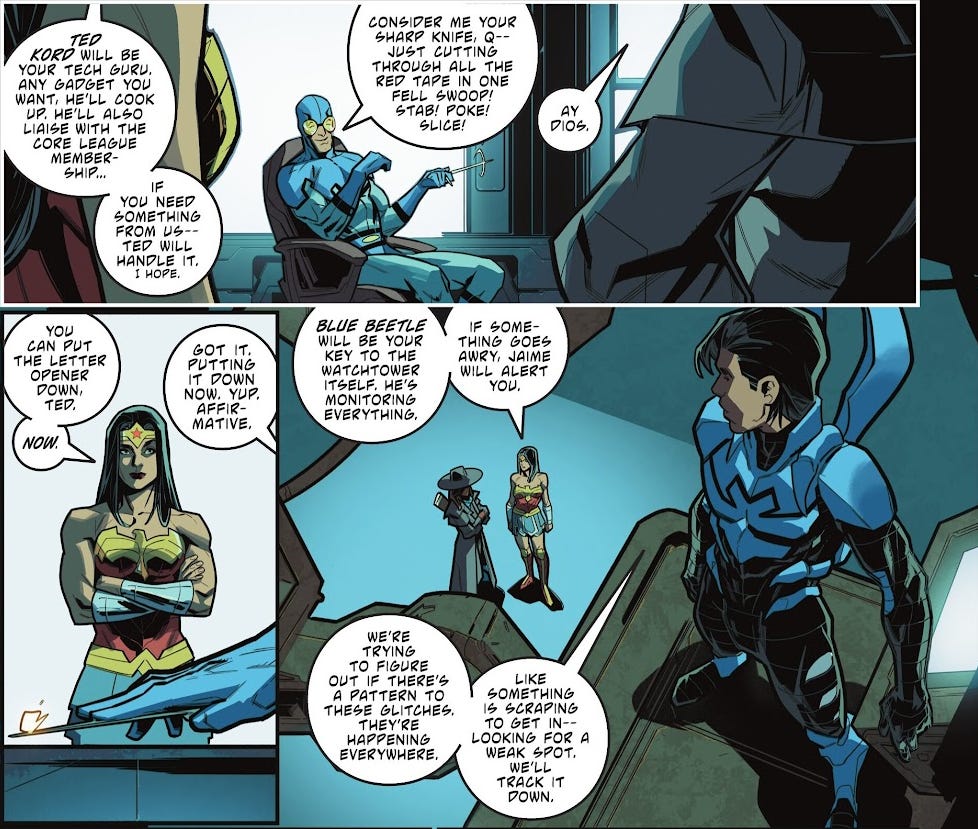
—Ted’s treated like he’s more of a goof than the actual genius he is. This isn’t the only example, either, but I did roll my eyes so hard that they almost just exited my skull. Because instead of showing us an engineer, a scientist, a martial artist and a hero, we get— uh— a scene about Ted somehow being too incompetent to dick around with a letter opener?
Really? This is the best we can do with this character in the year 2025?
And this Flanderization is all very directly traceable back to the Giffen/DeMatteis Justice League in the 80s and early 90s.
A thing a lot of people don’t know is that Len Wein had Opinions™ about that, and Keith Giffen was very much on the defensive about them. At the end of the day, though, I’m closer to Len’s opinion than Keith’s. As Len says in the Blue Beetle Companion:
“I hated it. I hated that comedy relief super-heroes were also part of the main line. I have no problem with comedy relief heroes and was writing the Blue Beetle as a fun character to begin with. But if you want to do something that’s slapstick and funny...don’t take somebody’s characters that someone has respect for and make them buffoons.”
While I do think there’s room for comedy in a book about people who dress up in brightly colored tights to punch bad guys, I also think that there’s a point where the humor becomes too much the goal, rather than just a piece of the larger picture, and with Ted— Giffen and DeMatteis crossed that line.
Keith outright admits that his familiarity with Ted when he started writing the character was limited to thinking he was basically a Ditko-created, wise-cracking, Spider-Man type, which means he didn’t seem to actually bother reading any of the prior works he was taking this character from. And you can tell. Ted’s characterization swiftly goes from genuine ass-kicker to a guy whining about being relegated to button pusher.
So, rather than writing Ted Kord, Keith Giffen was essentially writing an entirely new character with the same name and costume. It creates a very hard to bridge gap between Ted’s characterization in his solo and then in the JLI, too: We go from this exceptionally competent fella who was funny but very capable to— a guy who basically whines a lot? Is a lot more neurotic? Almost never kicks ass like we know he can? And schemes like it’s his job?
(One way the Blue Beetle Companion fails as a reference is that it regurgitates the same bullshit zeitgeist about Ted being the straight man to Booster’s scheming when it was very much the other way around back then. Booster, in the original JLI era, was actually fairly in line with his characterization in his solo, albeit if he was stripped of a fair bit of his pride and knocked down several pegs, whereas Ted was not. But Booster’s earnestness and his charming naïveté remained intact; as mentioned above, Booster’s characterization is rather cohesive. Having lost his fortune and mansion and sister and pretty much all of his fame, he doesn’t keep the public mask he wore in his Vol. 1; instead, we often see the earnest kid who’s really into being a superhero and is lonely as hell all at once, and who Ted gets into trouble far more than vice versa. And we see him change over time in a much more logical way.
I adore their relationship — as a friendship, and hell, you all know I ship-ship them, too — and so I necessarily do have to love some of the Giffen/DeMatteis characterization of Ted because it did give rise to this unlikely relationship between two characters you couldn’t have expected to gel like they did. But there’s still no pretending that their characterization didn’t damage Ted as a character seemingly permanently, too. Talk about a mixed bag.)
And the thing is, Len wasn’t the only professional — by a long shot — who felt that Ted’s characterization was permanently damaged by the choices Giffen and DeMatteis made. For example, Bob Layton (originally one of Charlton’s writers!) and Alex Ross (who needs no introduction) both share the same opinions.
Every time it came up in interviews, Keith seemed to be on the defensive about it, which suggests that he did probably feel some kind of way about how his characterization was taken by others.
As Keith says:
“You couldn’t take him seriously. He was so derivative of so many characters. The name ‘Blue Beetle,’ to me, said that the guy was not taking it all that seriously himself. I want to point one thing out, just for the record: nothing we ever did with the Blue Beetle was meant to denigrate the character. Marc DeMatteis and I had a great deal of affection for the characters that came to be known as our Justice League. We’re very proud of the way the Beetle/Booster team evolved.
“People will look at the old Blue Beetle of Ditko and even Paris Cullins and say ‘How dare you make fun of him?’ We were trying to do something with the character. Would you rather have this Blue Beetle, or no Blue Beetle? That was the only choice DC was giving at that point.”
The problem therein is that, as I’ve pointed out before, Ted wasn’t actually very derivative. He wasn’t Peter Parker. He wasn’t Bruce Wayne. He wasn’t Dan Garret(t), either. He was a unique enough and interesting enough character that Alan Moore wanted him (and the other Charlton heroes) for Watchmen originally. (And Dan Drieberg is a wholly worthy homage: Even in middle age, he’s a consummate asskicker.)
And obviously plenty of people did take Ted seriously, including Len Wein, who was writing the man’s solo.
Everything Keith has to say comes across like a man who knows he probably pushed it further than strictly necessary, and it’s actually his own writing that lends some credence to this theory.
Namely speaking: You can see the Ted Kord from this solo in Rebirth, where he’s Jaime’s mentor. Instead of being wall-to-wall slapstick, Ted takes the job seriously. He’s still quippy, but he comes across as smart and competent and not really thrilled about being sidelined as a superhero thanks to heart troubles (which Dan Jurgens later resolves with a single one-liner in Blue & Gold); he’s not the same kind of self-confident he is in Len’s series here, but he’s absolutely more in line with this characterization than in any other appearance before or since. (And yes, that includes Countdown, which was excellent but did feature down-on-himself, neurotic Ted.)
And the writer(s) of this renaissance in Rebirth?
Keith Giffen. Sometimes joined by Marc DeMatteis.
By comparison to how they wrote Ted in Booster’s Vol. 2 (or Justice League 3000/3001), Rebirth seems almost like an apology. Unlike the pseudo-maturity of the Super Buddies era that Keith likes to claim they gave him, there’s actual maturity in how he (and they) write Ted here, both as Jaime’s mentor and as a man who once pulled on his costume because he wanted to be a hero, not because he wanted to have fun. He’s depicted as a fairly brilliant young man who wasn’t quite ready to step aside, even with a heart condition.
Certainly it was a course-correction (and a very welcomed one), because it gave us back a glance of the second Blue Beetle as a sharp and competent man and an imperfect but heart-felt mentor to his successor. His and Jaime’s relationship only gets better and better over time, built off this initially sparky platform.
Bringing this back around to where I started: While I would love to spend more time on the Watsonian interpretation of Ted, much like I do Booster, Ted’s characterization swings too wildly to extremes to really allow it in the same in-depth way. I can touch on it, but not dwell on it, alas. If I were to hazard a guess — in-universe — as to why pre-Flashpoint Ted goes from being this very competent dude who has a loving girlfriend, a company he runs and the ability to kick the shit out of multiple villains at once to a jokey, scheming, neurotic kinda-loser, I’d probably try to take a shot that his confidence was shattered when KORD was stolen from him by his father and by the fact that Mel was the one who called the old man to do it.
That doesn’t explain how Ted got notably more sexist, but it does at least explain why he doesn’t kick the shit out of bad guys like he used to, and maybe a little of the neuroticism.
But ultimately, you can really only lay the blame on the Doylist side of things. And I can only really hope that some writer comes along in this modern day and remembers that Ted’s not only competent enough to play with a letter opener without admonishment, but he’s smarter than 99.8% of the people who keep overlooking him, as well as a capable fighter and a damn good man, to boot.
And now, back to your (very ir)regularly scheduled review.
Said Actual Review
We rejoin our Azure Avenger — I love that name — in the midst of his battle with Doc Alchemy, aka Eyebrows McGee, whose entire premise and threat level is thoroughly destroyed by his fashion sense. Just when we think we can’t find anyone who dresses worse than Ted, along comes this guy.
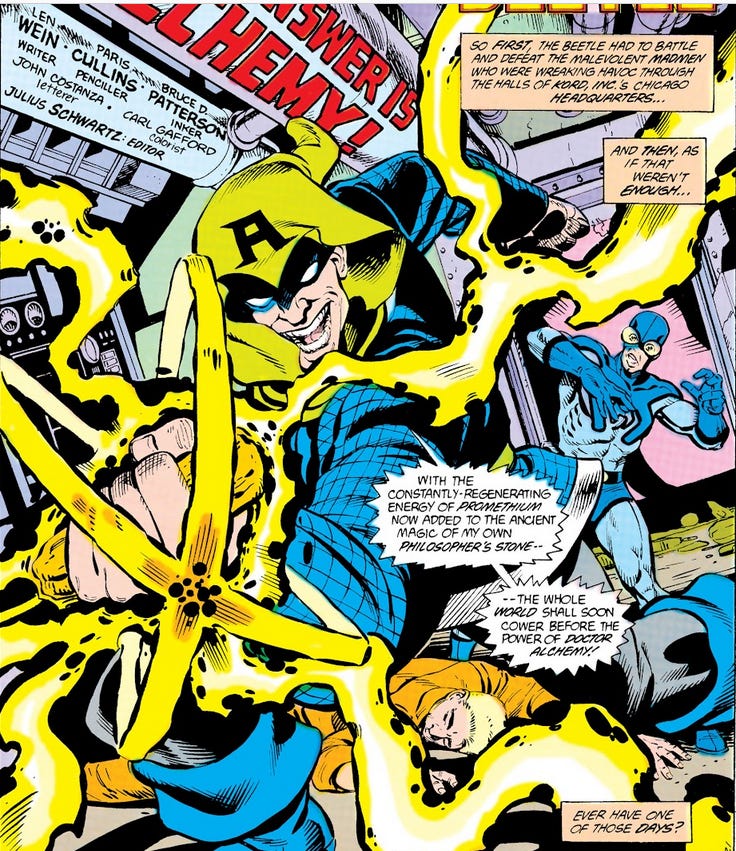
The entire first section of this issue is basically Eyebrows McGee turning various things into various other things while exchanging banter with Beetle, wielding both the promethium and his own melodrama. I can’t further pretend I’m interested enough in it — sorry, folks — to want to review it in depth because we don’t really learn anything new here. The bantering is fun (as it often is with Ted), but there’s not much in the way of substance aside showing off what Eyebrows McGee can do with his fancy stone.
We rejoin this comic with Angie picking her way through the wrecked KORD headquarters.
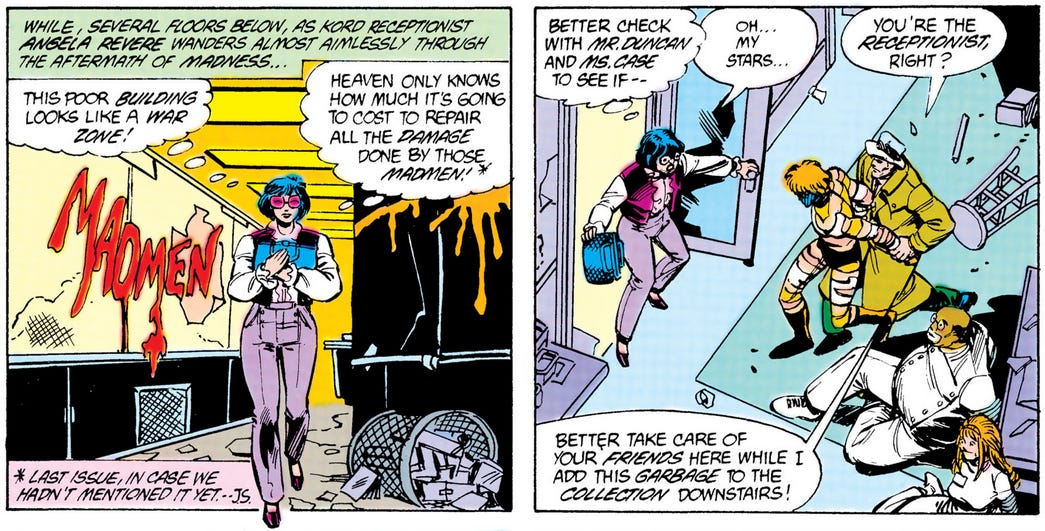
Our taciturn Lt. Fisher is busy taking one of the candy-colored villains out, leaving it to Ange to pull the tape off of Jeremiah and Melody and free them from their lousy captivity. How Jeremiah didn’t get half his mustache removed, I have no idea. Both he and Mel take things well; their interpersonal dynamic still pleases me, just because it feels and reads so organic. That really does seem to be one of Len’s greatest strengths when writing, at least in this book: Really hitting a human note with his characters. Where a lot of Booster’s secondary cast (outside of him, Skeets and a little bit of Trixie) reads as a collection of traits, all the regulars in Ted’s book continue to be very real. Right down to Mel’s awkward little ‘life’s tough and then you die’ thing.
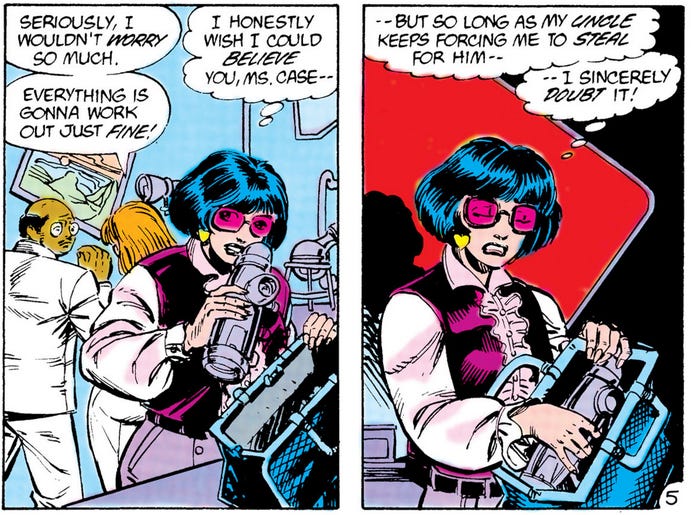
Lest we forget, Angie is still being menaced by her uncle. But then we cut back to Ted, rushing out of his elevator to get back behind his desk and back to pretending to be a besieged CEO of a building under attack. An interesting character beat takes place there unrelated to the attack by the Madmen: Ted doesn’t want Fisher smoking in his office and Fisher responds by putting it out, but not without commentary.
What makes it an interesting beat is back in Issue #2 where Mel asks Ted if he’s started smoking again. Given Ted doesn’t respond in any surprised way, that lends credence to the notion that he was indeed once a smoker. Combined with the way Booster later says that Ted hates smokers in ‘When Titans Date’, and you have this pretty neat little running theme that manages to cross several years.
Ted’s alleged time smoking only ever is mentioned in Issue #2. Seriously, it never once comes up again. But you can still see the shadow of it (or smell the faint remnants) throughout other moments and I always thought that was kind of neat. Most smokers are the badboy types — Constantine, Wolverine, Gambit — and not genius athletes like Ted Kord.
(My Watsonian theory would be he started when he was trying to lose weight between high school and university, but didn’t like that feeling of needing it, and therefore managed to quit again. Hell, maybe with Murray’s help even.)
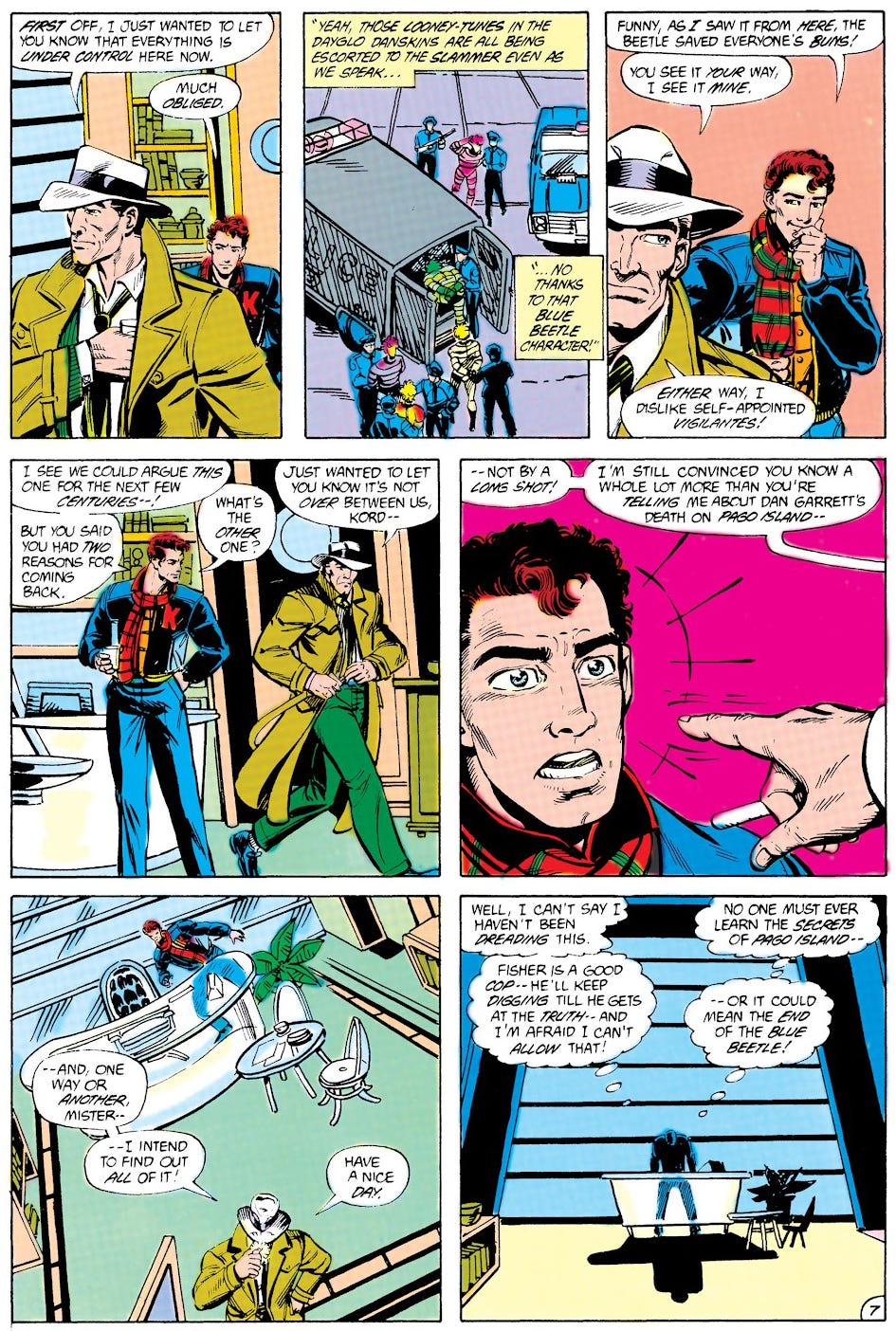
Anyway, after some charming banter where Ted’s embodying the ‘I’m just a little scamp’ vibe, Fisher decides to drop a bomb on him by making sure he knows he’s in the crosshairs about Dan’s death.
I like how Ted acknowledges that Fisher’s a good cop. (Contrast again to Broderick in Booster’s book, who we have not met yet, but is one hypocritical piece of work like— most of Booster’s cast, tbh.) While I don’t necessarily believe there are many — if any — good cops myself, I do understand that they were viewed differently back in the day this book came out. Not that they didn’t still beat and murder unarmed non-Caucasian people (or queers, or the mentally ill, or the desperately poor), mind, but it was overlooked a lot more, if I recall, and police in media were almost never depicted as overtly corrupt. And if they were, then they were firmly outliers.
Anyway, it does say something for Ted’s general belief in people that he gives Fisher that credit, I think.
And as if by summoning, we glance at Conrad Carapax, still roaming around Pago Island like a very lost, very sorry tourist. This, as we all know, will eventually play out— but not yet.
Then it’s back to Chicago to check in on Doc Alchemy, aka fucking Alvin Desmond. No wonder this man’s a villain. Seriously.
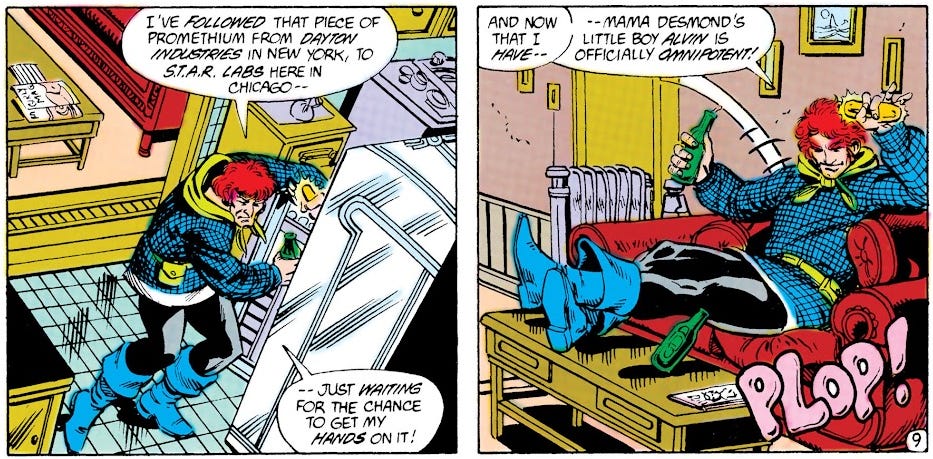
Not content with having the ability to literally turn his beer into a whole mint of gold, though, Alvin here wants the ability to do it without having to hold the stone which allows it. He wants to become the stone, because no one ever said he had two braincells to rub together or that the ‘Doctor’ is a title he actually earned in any way, shape or form.
Upon seeing that self-own start shaping up, we head back to KORD for more cleanup and the somewhat achy little interplay between Ted and Mel.
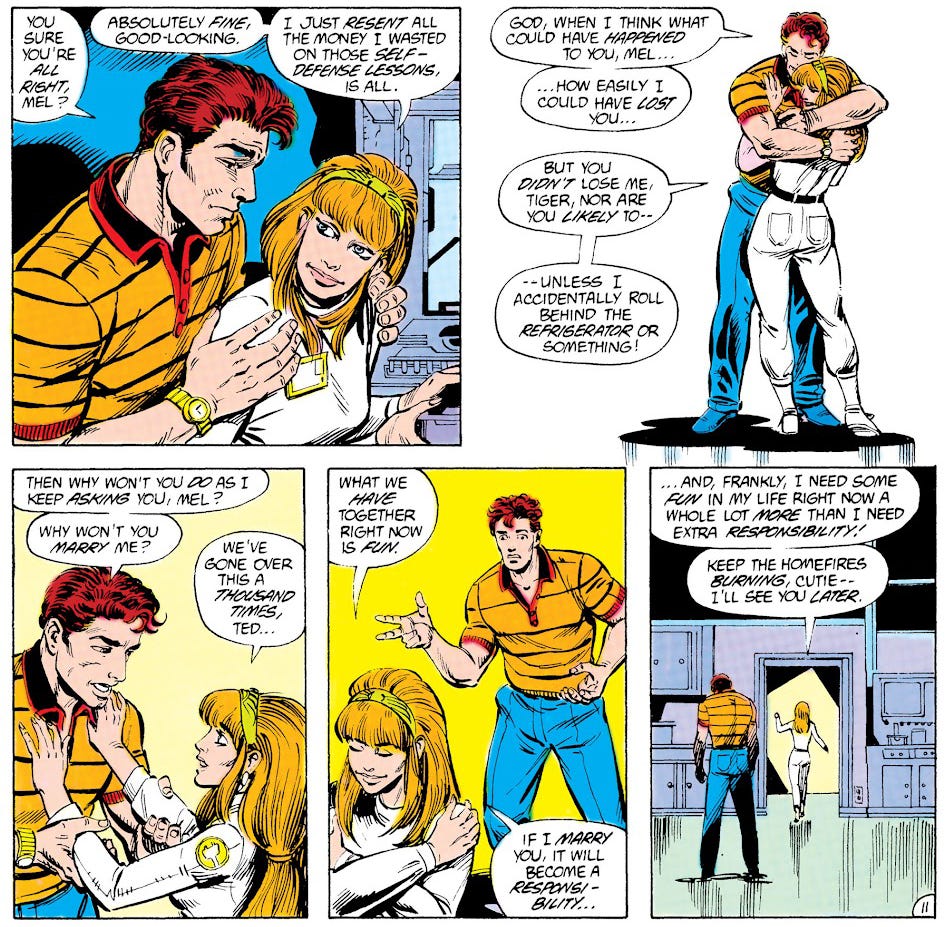
I actually really do love Ted and Mel as a couple. They aren’t my primary Ted ship (obvs), but I love how earnest and sweet they seemed early on here. I get Ted’s desire to marry her, certainly; she’s funny and smart and pretty tough, all traits that I think complement the multi-talented Ted Kord. I also appreciate, though, that Mel’s sincerely not interested in marriage right now. Unlike the modest man-scold that Trixie is/becomes, Mel definitely doesn’t seem to be in any hurry to tie herself down, even if she loves Ted and vice versa.
That being said, I also feel for how crestfallen Ted clearly is to be turned down again. He feels strongly enough for her — strong enough to want to marry her! — that when she later seemingly turns on him, you can get where that would be pretty devastating to his self-confidence and heart.
Ted does sort of dip into something borderline sexist in the next couple panels, though, with his commentary on ‘women’, though it’s clearly framed as a (not particularly good) joke, rather than any sincerely held belief:
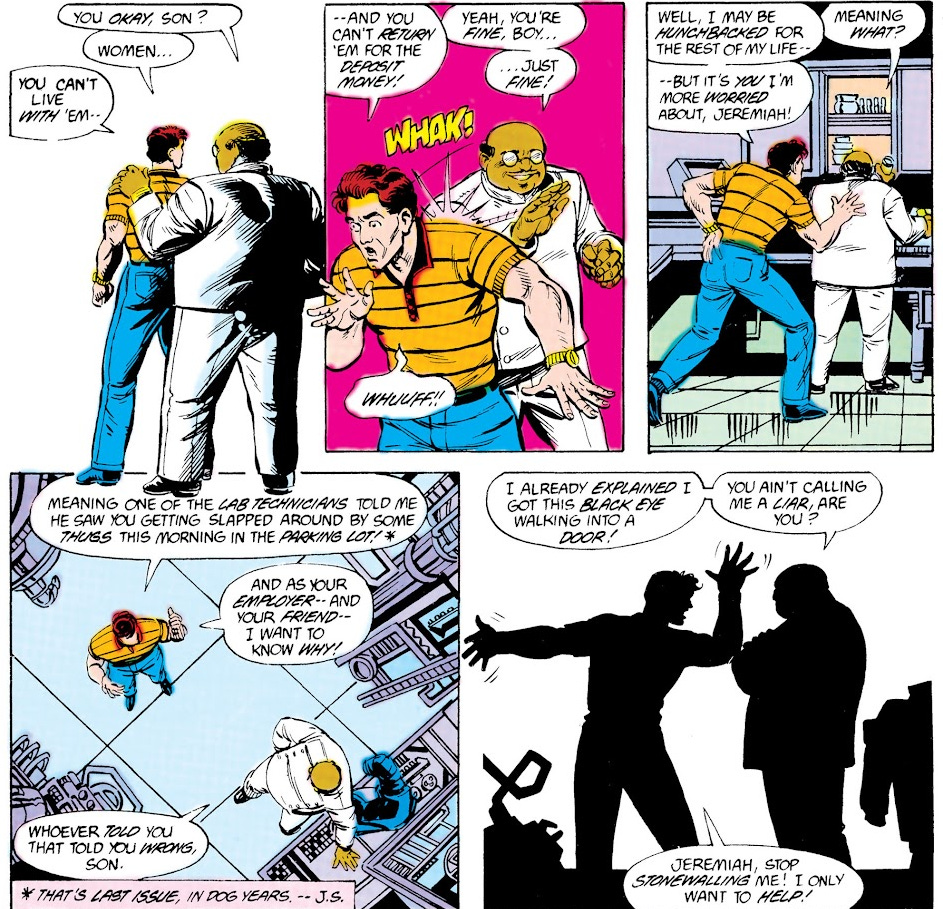
Ted’s actions in this book are consistently those of a man, for the most part, who might parrot the occasional dumbass sexist joke aloud, but who doesn’t ever treat women like they’re in any way inferior. So, while I do hike my eyebrow there, I don’t necessarily feel it damages the character.
Ted tries yet again to reach Jeremiah in worry and once again, Jeremiah rebuffs his overtures hard. Another thing, though, that I very much like about Ted’s characterization is that he doesn’t lord his power as company CEO over any of his employees. He seems to take the notion seriously that he’s as more there to serve them and the furtherance of their careers than vice versa, though again, he does start failing on the job because he’s way more interested in being a superhero at the moment.
From there, it’s back over to Alvin, who suffers a swift and excellent illustration of the ‘fuck around and find out’ concept:
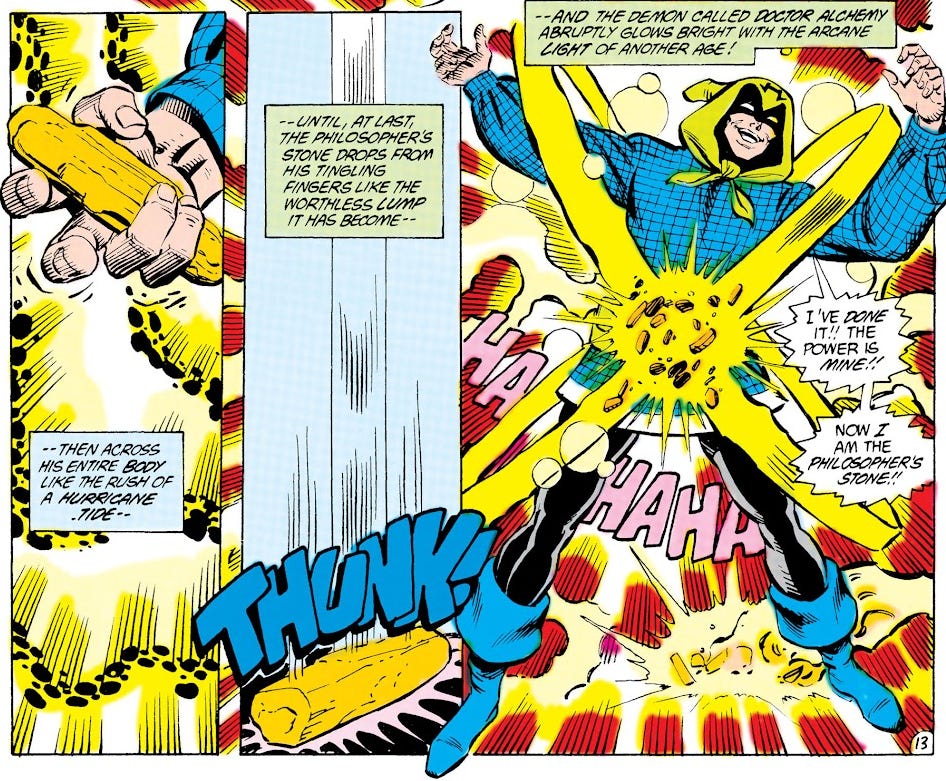
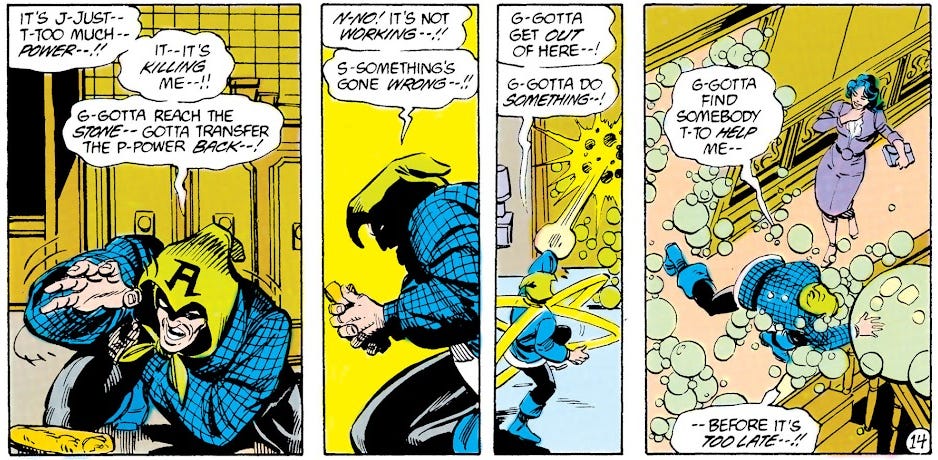
As I mentioned, he sort of just defeats himself in this issue. It doesn’t really reflect badly on Ted, though; it reads as a pretty organic means of dealing with a villain in and interesting manner while setting up for further plot down the road. (Which we will eventually get to, promise.)
There’s more interesting drama to be found (for me) when we go back over to KORD, where Murray is rightfully letting Ted have it, albeit not with both barrels. Maybe just a single barrel. And bird shot, rather than buck shot. What I love about it is the same thing I’ve been writing about loving: How organic that relationship and conversation feels. After reading Dan occasionally writing some incredibly clunky (and cringe-worthy) dialogue over in Booster’s book, Len’s ability to make people actually talk like people is a definite breath of fresh air. (It’s one of the things people also love about the Giffen/DeMatteis JLI, too, for that matter.)
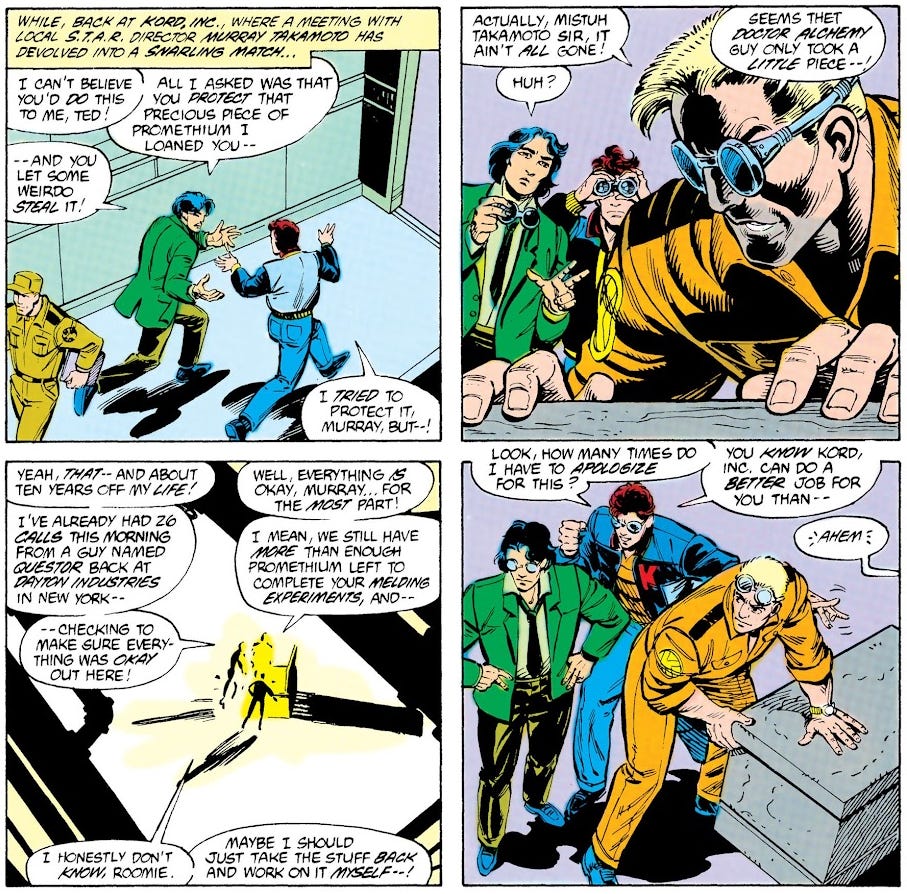
There’s a lot to love about a book that lets its lead character screw up, but in a normal way, not in an earth-shattering, angst-ridden, attempting-to-pretend-that’s-character-growth way. It’s again another of the things that make Ted very non-derivative, because it’s not actually that common in comics from this era. I think they’ve gotten better at it in more recent times, but the essential humanity is what shines here (and also, while we’re at it, in a lot of Captain Marvel’s old stories, pre-DC).
Anyway, though, it’s Angie who inadvertently rescues Ted from any more of a tongue lashing by letting everyone know Eyebrows McGee is attacking STAR Labs. This sends our intrepid heroes into motion, which leads to this wildly charming little set of panels—
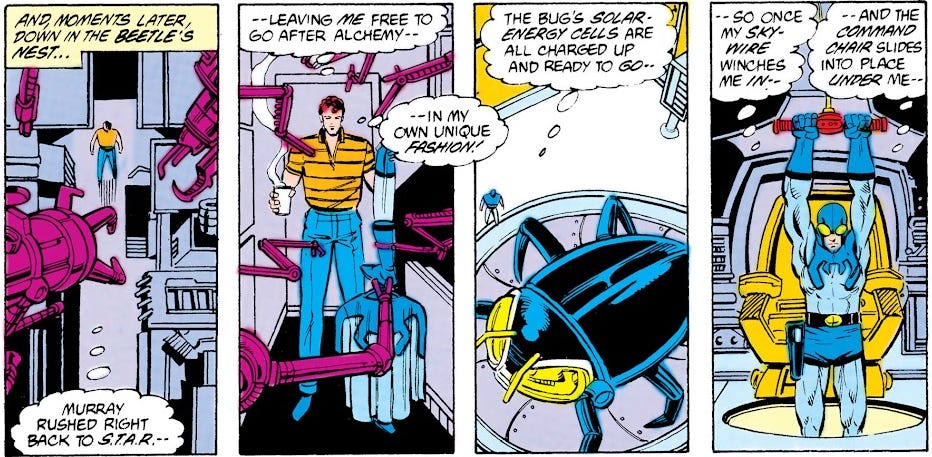
—where our beloved boy in blue gives us a sweet little rundown of his awesome tech. It’s still not particularly clunky, even if it is decidedly expository, but in this case, the expository part makes sense: A lot of Ted’s tech relies on the unseen. IE, solar cells. Though, I do still wonder how the actual hell the man was able to construct all of this without any apparent help. He had to have some kind of help doing it, because even as brilliant as Ted is, there’s just no way for one man to pull off construction on this level without an army of contractors, or at least, an army of robots. Even Batman’s cave makes more sense.
Even so, we don’t actually need to know the answer to that. Though it makes for fun speculation.
We skip over to STAR where we get a cameo of Vic Sage, another Ditko-created Charlton character best known as The Question, though currently he’s in his very public guise as a TV reporter.
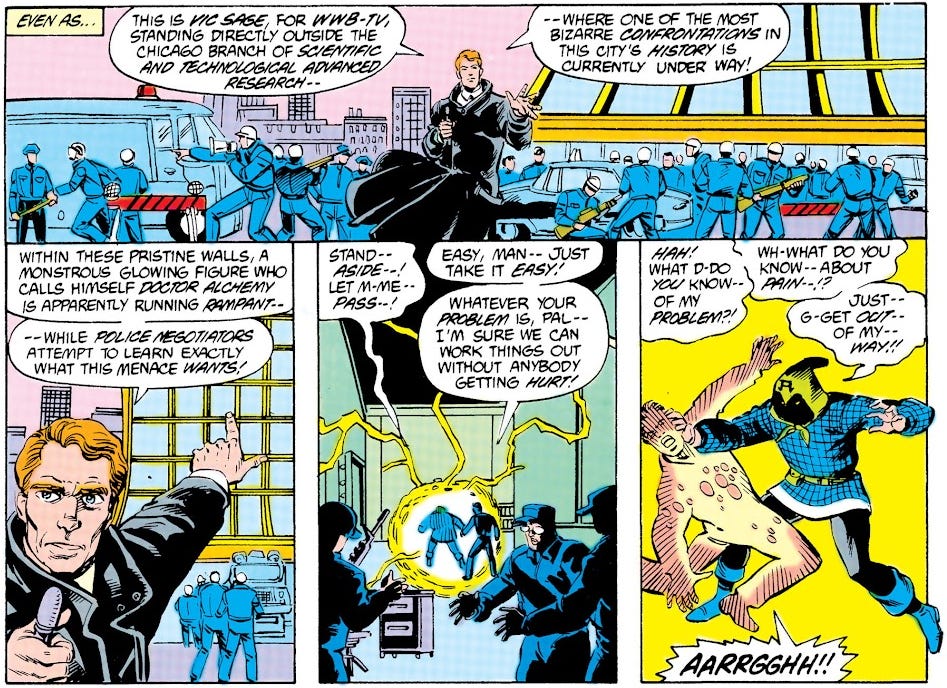
Even while Vic reports (and speculates) outside, though, Alvin continues disintegrating mentally while transforming people into various non-people substances. I will half-way give him this: When he realizes he’s turning people into crystal and whatnot, he seems suitably horrified, though not probably enough to be considered redeemable. Still, he tries to warn the cops back for their own sake, which I suppose means he’s human somewhere under those eyebrows and the babushka hat.
Ted arrives not quite as in the nick as he thinks he has, only to find a harrowing scene—
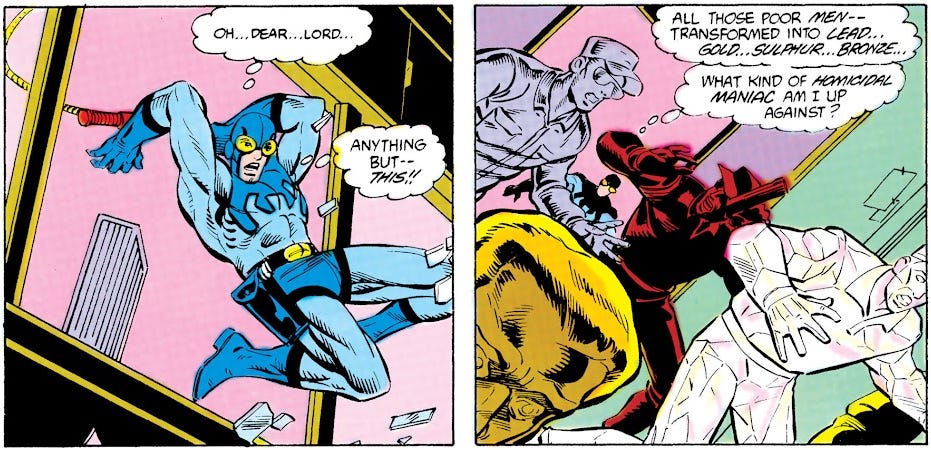
—which he is very understandably distressed by. If I could say there’s one thing before anything else that I wish Ted had carried forward into the JLI era, it’s his very essential compassion for people in this book. Even more than his competence, even more than his badassery and brilliance, I wish that they had kept that open-hearted caring he displays on these pages.
While I don’t think Giffen and DeMatteis so much meant Ted to come off as cold or disinterested in the plights of others, they did shift somewhat his motivations for being a superhero in the first place and Ted doesn’t display — aloud or in the privacy of his own thoughts — the same level of kindness in their hands. It’s a loss, I feel, for both character and reader.
Anyway, one can never accuse Ted of being a coward: Even after seeing all of these people transformed and therefore possible made very dead, he forges forward with determination to put an end to this and stop Alvin’s unfortunate rampage through STAR and hopefully keep him away from an ion generator that could well blow the neighborhood off the map.
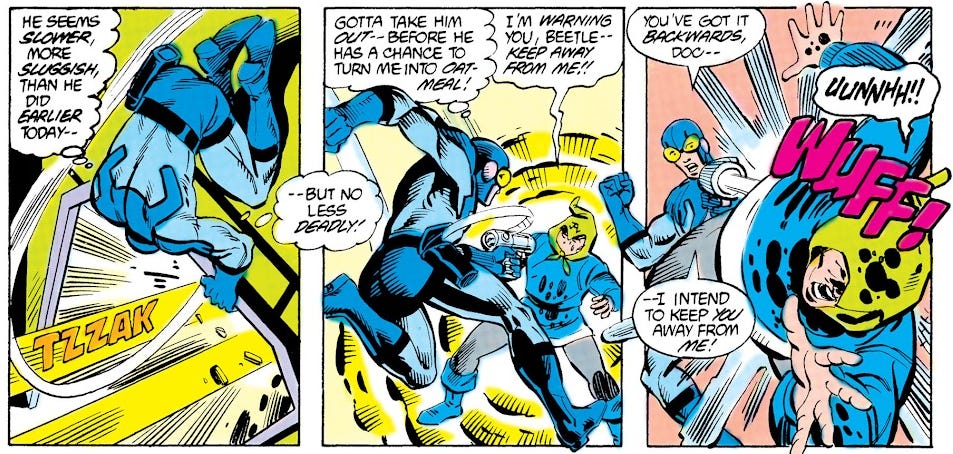
After some more evidence of our Beetle’s badassery (and fantastic fighting skills), he loses his BB Gun — which gets turned into coal! — but continues to evade getting transformed into anything non-organic himself, despite Alvin trying to straight up kill him. Unfortunately for Ted (and Alvin), this is definitely a case where the villain pretty much just defeats himself.
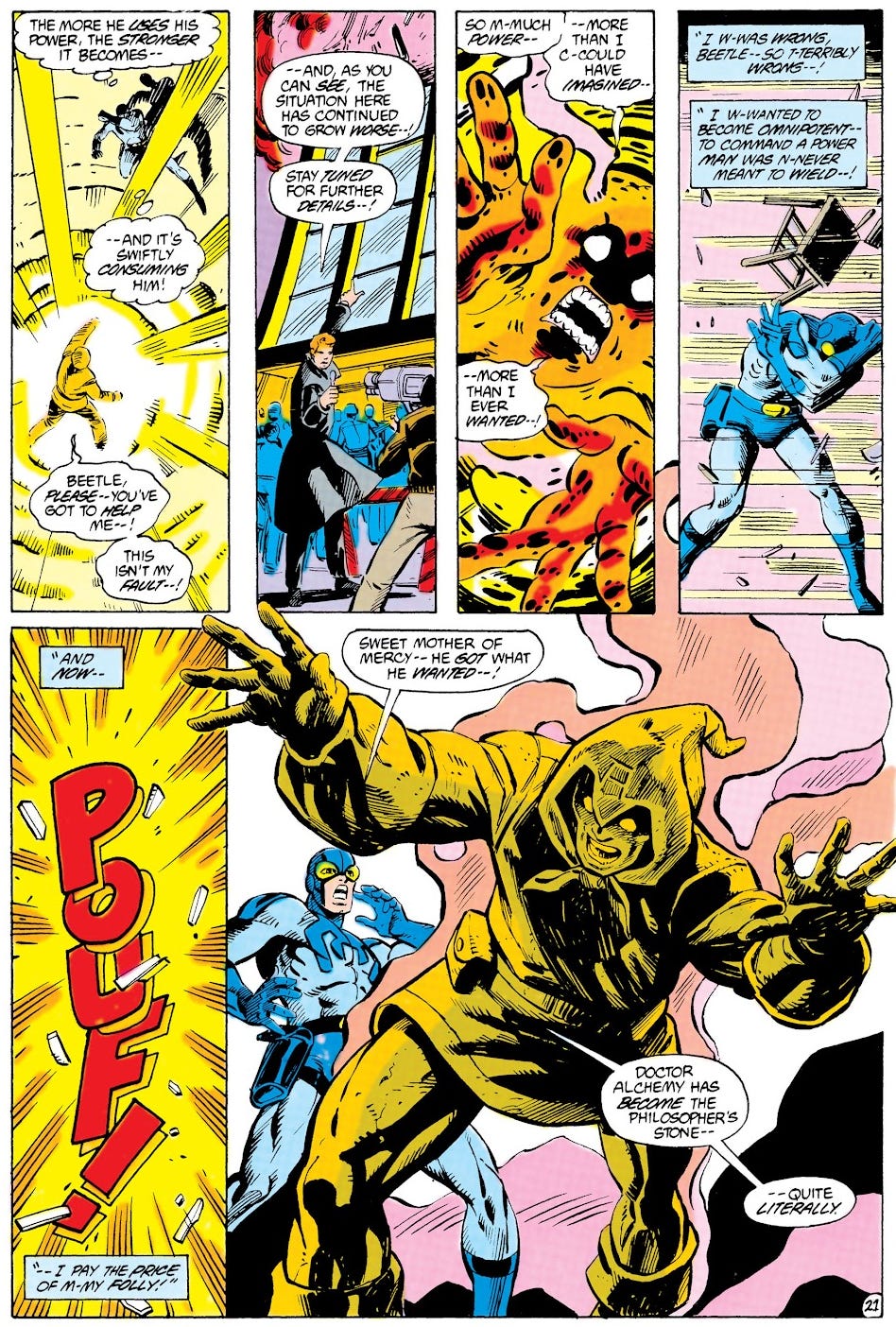
All in all, as issues go, it’s kind of a lose for Ted all around. Not a catastrophic lose, but one nonetheless. His friend Murray is a bit miffed at him, he didn’t actually vanquish (or save!) the villain, his girl turned down his marriage proposal, Jeremiah rebuffed his attempts to be helpful, Fisher is on his ass—
We close this one out with Murray talking to Vic (and unwittingly admiring his friend, albeit in costume) and a promise next issue of a team-up that I’ll bet was exciting for original fans of the Charlton Comics: Blue Beetle and the Question!
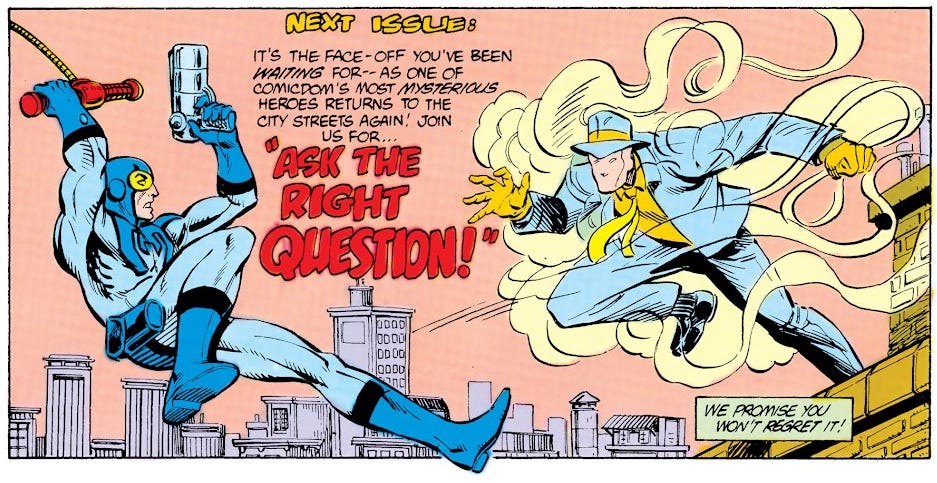
I’m not really a huge Question fan myself, but I do find how Ted acts and reacts to other costumed types eternally interesting. Here in this book, he has yet to come across as the kind of man who measures himself against others and come up wanting, which we all know won’t be the case in his future; still, for now, our Blue Beetle is the hero of his book and we still have a large number of issues where that remains the truth.
Just as a note, I know this review was a long time coming. And I’m still testing out the transition to Ghost. The mixed blessing and curse of being employed full-time is the lack of time for fun stuff like this; it’s all I can do to keep up with the demands of capitalism and home. But I am still out here and still having a grand time reading and reviewing these books, so if you’ll stick with me, I’ll do my best to measure up to it.
In the meantime, take care and see you next time for Booster’s fourth issue!
